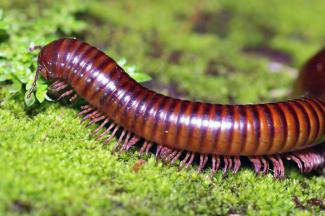
Instructions
Do the preparation task first to help you with the difficult vocabulary. Then read the article and do the exercises to check your understanding.
Conservation efforts often focus on well-known species like the panda but how about other species? Small, lesser-known organisms such as the millipede play a very important role in the environment. Millipedes do amazing things in the soil in our forests and although their activity is invisible to most of us, it is essential for life on Earth.
Autumn
Millipedes play their vital role in the autumn, as leaves slowly turn yellow and fall to the ground after months of hard work capturing light, fixing carbon dioxide and producing oxygen. There is still one last job for these leaves to do: made of carbon compounds and nutrients, they must decompose and return their carbon to the atmosphere and nutrients to the soil. Forest life depends upon this decomposition since without nutrients, the soil would quickly become infertile and without carbon dioxide, photosynthesis would be impossible. Many species would be endangered if that were to happen, since plants are at the start of nearly all food chains.
Decomposing leaves
Fortunately, numerous small organisms help to decompose leaves on the forest floor. The soil is not as lifeless as people often think: it is full of bacteria and fungi which chemically break down organic matter, and these organisms are called decomposers. Decomposers are especially attracted to leaves which are rich in nutrients, and they can break them down in just a few months.
Stealing nutrients from the rich
However, not all leaves are equally rich. Some are thick, dry, nutrient-poor and unattractive to decomposers, who tend to leave them alone. Can anything help these poor leaves to decompose? This is where the millipedes come in.
Millipedes feed on leaves but because they have a very simple digestive system, they can only absorb a small part of what they eat and they return most of it to the soil as faeces. When this happens, leaves which were rich or poor in nutrients become much more similar. In other words, after being eaten by a millipede and turned into faeces, the amount of nutrients in the leaves seems to equalise. For decomposers, that means rich leaves become slightly less attractive and poor leaves become more attractive, and this gives the poor leaves a better chance at decomposition. For that reason, by taking from the rich and giving to the poor, millipedes are perhaps the real Robin Hoods of the forest.
Which animals do you think are amazing?

Comments